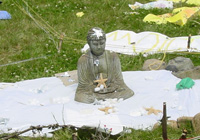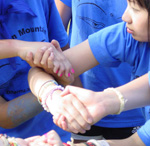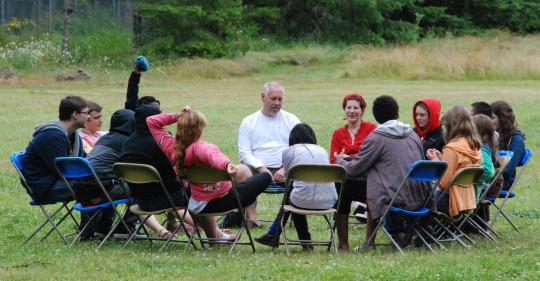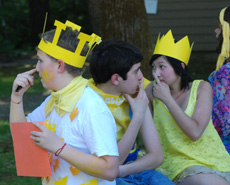July 20-25, 2025, at Molalla Retreat Center in Oregon
Register here!
Dharma Camp: Mandala on the Mountain
Mandala on the Mountain, also known as Dharma Camp, is a week-long, overnight summer camp in Molalla, Oregon, for kids aged nine through eighteen who are interested in Buddhism. The camp experience combines traditional camp activities, such as swimming, crafts, sports, and a campfire, with Buddhist practices like meditation, a chanted morning service, silent breakfast, and mindful work practice. Campers come from a variety of traditions and have different levels of familiarity with Buddhism but are willing to participate in our forms for the week of camp.
A deposit of $100 is required to reserve your spot. Tuition is $550. Drop-in attendance is not available. Registration is open now! If you would like to request financial assistance, you may do so here.
More about Dharma Camp
We try to tailor the rigors of camp to the age and experience of our kids and give them challenges that encourage them to discover their inner resources.
- What makes it Buddhist?
- What makes it summer camp?
- Who teaches?
- Who attends?
- History
- Cancellation Policy
What makes it Buddhist?
We include some forms that may be familiar to those who have gone on retreat at a Zen center, such as morning meditation, a chanted service, keeping a period of silence, a formal meal, and work practice. Most of the forms we use derive from Soto Zen, but we include teachings from different schools of Buddhism.

Campers take on additional responsibilities to support the container such as timekeeping the morning meditation period, tending to the altar, or ringing the densho bell to bring the camp to morning meditation. This is a very challenging lifestyle for our campers and they enjoy bragging about having survived the difficulty of the practices.
In addition to explicit forms, we explore the Buddhadharma in our lives during two daily class times.

The day’s first class time is a discussion period broken up into age groups, ie., all the high school students are together, the middle school students are together, and the juniors are together. This is a time to talk about life in a peer group and explore life through the lens of the Dharma. For example: the high school group may spend some time during the week exploring a koan together and how the koans manifest in their own present lives.
The day’s second class time in the day is when we break up into enlightenment groups. Each camper is assigned a factor representing one of the seven factors of enlightenment and meets with other campers and counselors of that factor over the course of the week. We try to get a range of ages and genders in each group. The emphasis here is on getting all the kids to get to know each other, and to explore their group’s particular factor of enlightenment through group discussion, activities, and projects. Group cohesiveness is also important for the “Buddhalympics,” where enlightenment groups square off in a series of challenges that require cooperation and creative problem solving. At the end of the week, each factor group puts on their own skit to express what they’ve learned.
Beyond words and forms, we are trying to instill in the campers some values of caring for themselves, one another, and the world around them. Because many of the kids have been in Dharma School with us and the staff are Zen students or Dharma Camp graduates, we already have a set of values in place that are expressed through actions and modes of being. We strive to keep the atmosphere friendly, safe, and supportive by modeling and creating a container that encourages the manifestation of right speech and action.
What makes it summer camp?
Just getting that many kids in one place sort of creates its own momentum, and if it is the middle of July at some rural location, we can call that momentum “summer camp.” That being said, the basics of any summer camp are part of Mandala on the Mountain.

We get our exercise playing ultimate frisbee, swimming, capture the flag, acrobatics, an ever-escalating water fight, and playing in “The Pit.” We build community during the day with special activities like taiko drumming, building a tower, juggling, putting on a play, and harvesting plants to dye t-shirts, and during campfire with skits, songs, and much laughter. We form friendships over origami and beading, going on walks through the woods, hanging out with new people, and having long conversations under the stars after campfire. There is plenty of free time during the day for campers to make camp into what they need it to be: taking naps, bouncing off walls, having more personal conversations, writing a letter or in a journal, putting the final touches on an art project, or finding some space by themselves.
We learn a lot about each other in the course of a week. The bonds that form in this time are felt year-after-year for those coming from farther away just for camp, and, for Portland-area kids involved in Dharma School, carry into the school year. Camp becomes quite a close community in just seven days, and goodbyes are difficult. We also learn something about who we really are, and often, by the end of the week the counselors can see changes in how the kids are taking care of themselves and others.
Who teaches?
All the staff involved with Mandala on the Mountain are either volunteers recruited from members of either Dharma Rain Zen Center or Great Vow Zen Monastery; or campers who have aged out of Mandala on the Mountain and have returned as staff. All come with the recommendation of the teachers at the two Zen Centers. New staff members act in assistant roles for a year or two to become familiar with the system and culture of this camp. Some staff are counselors and some function in supportive roles such as cooking, music, or administration.
Who attends?
Primarily we draw from kids whose parents or families participate in a Buddhist sangha of some sort in the northern Oregon and southern Washington area. Many are fairly new to Buddhism, while others have been raised Buddhist their entire lives. We have had a few campers with no prior experience with Buddhist practice, but this is not usually recommended.

We have had campers from Minnesota, Montana, Missouri, Louisiana, Florida, and California. The number of campers has grown steadily over the years. Our first Dharma camp was in 1994, with six campers. The first weeklong Dharma Camp was 1997, with fourteen campers. 2015 was our biggest year; with 59 kids. In 2016, we capped registration at 55 children. Most years, the age range is from 9 to 18 years old, 20-25 percent of campers are ethnic minorities, and we have a fairly even mix of male and female campers. Many had spent time away from home before, but not all.
One group that does not attend is parents or guardians. Mandala on the Mountain is not a family camp; it is specifically for the children. Other activities at Dharma Rain Zen Center are for both guardians and kids, but we find that it is important to enforce this boundary during camp. Mandala on the Mountain is a challenging, intensive situation, and not having parents around helps in building trust and intimacy within the group of peers and counselors. We do invite parents, siblings, and extended family on the last day, when the camp performs skits and songs and a celebratory luncheon is provided for all.
History
We started with an overnight at the center one weekend one January with a few of the girls who seemed to be ready for something more than Sunday school. For their overnight, they joined the Zen Center residents for dinner and learned something of the formalities of our “informal” meals. Then after dinner they were part of the clean-up crew and got a lesson on what would happen for morning practice: wake-up bell, silence, silent passing of the oatmeal, chanting, eating everything in your bowl, etc. After the lesson they watched a video and ate popcorn just like at a slumber party. In the morning, they followed the routine with very little prompting and were very proud of themselves when they got through it all.
They were so pleased with themselves that we started to think summer camp might be possible. Our aim was to invent a schedule that included some of the important elements of a retreat and had the effect of making the children stretch, but also would leave them feeling as if they had had fun. Those kids have all graduated from high school now, but the tradition they pioneered has flourished.
Cancellation Policy
A full refund will be offered to campers who cancel their registration 60 days before camp. A partial refund (tuition minus deposit) will be offered to campers who cancel their registration 30-60 days before camp. Cancellations that occur less than 30 days before camp will not be refunded.
